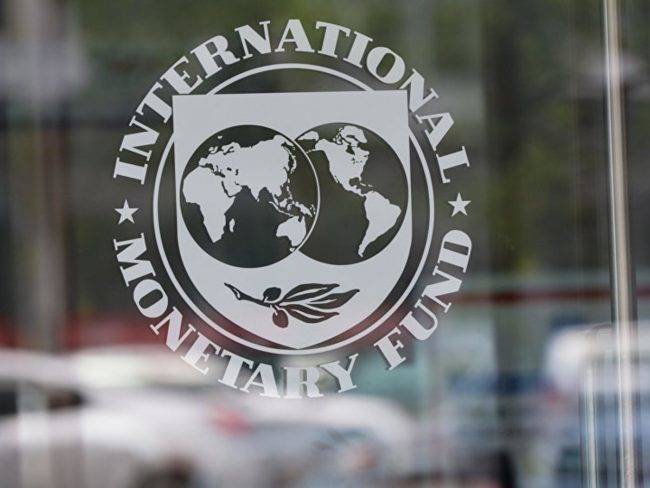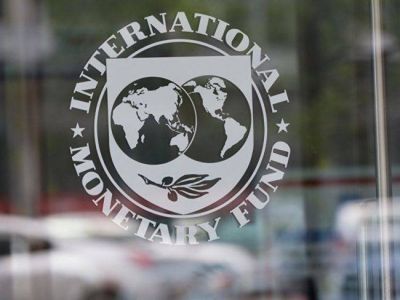
Lebanon is expected to receive a share of about $900 million in an anticipated upcoming allocation of IMF Special Drawing Rights. (Credit: AFP)
The International Monetary Fund executive board has adopted the decision to issue a general allocation of Special Drawing Rights equivalent to $650 billion. This largest allocation in the IMF’s history will create new resources for countries in need, boosting the liquidity and reserves of all IMF member countries and strengthening their response to the COVID-19 crisis. The proposal will be sent to the IMF board of governors for approval in early August. The allocation would be implemented 21 days after the board of governors’ approval.
Lebanon is expected to receive a share of approximately $900 million (Lebanon’s SDR quota is $633.5 million and the value of each SDR as of July 9 is equivalent to $1.42). Lebanon is in great need of liquidity in foreign currency. If a serious political decision is not taken on how to use the expected amount, it will be added automatically to the foreign exchange reserves at the central bank. Consequently, and unfortunately, it will be depleted in the same way that led to the loss of billions of dollars on an unaffordable, inequitable, inefficient and wasteful subsidy program.
With the current economic and financial crisis that has been aggravated by the COVID-19 pandemic resulting in the worst social and humanitarian crisis that Lebanon has ever experienced and the third worst economic crisis in the world, the private sector has been the only one capable of sustaining what is left of our economy. Resilient Lebanese business leaders have faced all possible difficulties, from bank restrictions and the devaluation of the Lebanese lira to total lockdowns and huge losses. Despite all odds, most of the Lebanese companies continue to struggle to survive, but to do this many were obliged to reduce their workforce to match the huge drop in their turnover while paying significant direct and indirect taxes due to the absence of tax collection from the shadow economy. Needless to say that contrary to other countries, the Lebanese government didn’t provide any help or subsidy of any kind to the private sector.
Support the private sector
While the central bank’s foreign exchange reserves, which in fact represent commercial bank depositors’ money, have been depleted and wasted by the inequitable and inefficient “subsidy” program, the IMF SDR allocation in response to the COVID-19 pandemic may be an opportunity for Lebanon to support the private sector and stop the expensive and inefficient current subsidy program that has been fueling corruption and the smuggling of subsidized fuel, medicines and other products to Syria and other countries.
In order to ensure the traceability of humanitarian and social aid, and prevent any political interference, we should grab the opportunity the SDR funds offer to restore the economy, create job opportunities and identify businesses that are currently evading tax. From this perspective, the Lebanese businessmen and women association (RDCL) is recommending that the SDR funds be used to finance the World Bank’s social safety net project and priority infrastructure investments needed to fend off the escalating social chaos that will result from the end of the current subsidy program.
On the humanitarian and social side, we recommend that the amount would be allocated to finance the direct cash transfers to households program elaborated by the World Bank. The study prepared by the World Bank found that by shifting to a broad coverage (80 percent of the population) the cash transfer program would be more effective and efficient. In fact, stopping the current subsidy program would eliminate the smuggling, improve Lebanon’s balance of payments, meaningfully extend the time-till-exhaustion of remaining BDL reserves and help cushion the impact on Lebanon’s poor and middle class.
However, it is important to make sure that the political class and its clientelist network will not exploit the implementation process. Therefore, several options may be studied, such as benefiting from the SDR funds to finance the direct cash transfers to households through electronic prepaid cards while using the existing IMPACT platform, that was successfully used to manage the COVID-19 crisis, to register all the Lebanese citizens in two main categories: 1. jobless, retired and in-need individuals, and 2. employees in the private and public sectors.
The registration of individuals and businesses should be overseen and controlled by different independent external bodies, such as the World Bank, for the individuals’ category, and external auditors who should report to a committee made of representatives from the National Social Security Fund, the Social Affairs Ministry and the Finance Ministry, as well as civil society representatives (active NGOs in the field of humanitarian aid) and the private sector (the “Committee”).
For the registration of businesses on the IMPACT platform (for both the public and private employees), the NSSF and the Finance Ministry should provide a list of registered companies, public entities and individual entrepreneurs (very small businesses, such as hairdressers, electricians and plumbers) with a list of their employees, who should be registered in both the NSSF and at the Finance Ministry to benefit from the subsidies. This registration process should be controlled by independent audit firms, who should report directly to the Committee any discrepancy or irregular registration on the platform.
Once the registration phase is completed, a window will be opened for the registration of businesses and employees that do not appear on the NSSF and Finance Ministry lists. Such informal businesses would have previously been concealed taxpayers that the Finance Ministry was unable to identify: due to the suspension of legal and administrative obligations as a result of the COVID-19 crisis and the explosion on Aug. 4 at the Port of Beirut, the deadline set in the Budget Law 2019 on the procedure to identify fraudulent businesses was postponed to the end of August 2021. Furthermore, many businesses employ persons who are not registered at the NSSF to save on social contribution charges.
The registration process described above will be an opportunity to push the concealed taxpayers to register at the MOF and the NSSF in order to benefit from the subsidies and thus increase the tax income in order to create fiscal space to finance this social protection program, while at the same time reducing the burden of the informal economy.
The subsidies should be transferred through the IMPACT platform to the identified individuals (proven jobless heads of families and disabled or retired persons) in fresh cash US dollars credited on debit cards to better monitor the cash payments. These subsidies should cover the recipients’ critical needs in terms of health care, food, nutrition, education and water.
On the other hand, the subsidies to employees of businesses should be channeled through the companies but should be paid directly to the employees through the same mechanism set for the individuals on the IMPACT platform to avoid any eventual cash flow issues to the companies. These subsidies should cover the existing social allocation scheme that includes transportation, food and schooling under the current laws and regulations. However, the deductible ceiling of these social allocations should be increased along with the amount of the subsidies to take into consideration the current inflation, and it should be higher than the amount granted to the jobless individuals. This incentive should represent an additional amount of subsidies paid to employed people to encourage them to keep their jobs and motivate jobless individuals to search for a job.
‘Employment bonus’
In addition to the above-mentioned subsidies to individuals and employees to cover their critical needs, the business section of the platform will allow an additional new employment subsidy that can be called “employment bonus” for the hiring of any new Lebanese employee that is either a fresh graduate or a jobless person who lost his job due to the economic and COVID-19 crisis. This bonus will cover the salary of this new employee for one or two years, knowing that businesses hiring such new employees should maintain their current workforce (no layoff will be allowed) to benefit from this “employment bonus” and can also benefit from the existing incentives set in the 2019 Budget Law that exempt them from social security contributions (supported by the Investment Development Authority of Lebanon).
Young and jobless Lebanese citizens will be encouraged to find a job to benefit from more subsidies while entering or returning to working life. Very small businesses and entrepreneurs will find an advantage in registering themselves on the official Finance Ministry and NSSF registers to benefit from free labor (“apprentices”), such as electricians, plumbers, carpenters and craftsman, that they can train to learn their profession and thus sustain essential professions.
These measures will also help replace foreign labor with Lebanese nationals and thus contribute to reducing the deficit in the balance of payments through the reduction of the outbound transfers of foreign currencies. It will also be a first step in the e-government reform under which all Lebanese citizens will have a unique identification number (which will obviously be their Tax Identification Number, or TIN) and a milestone in the proper governance and accountability of public affairs through the collaboration between the public and the private sectors with monitoring committees and audits undertaken by independent audit firms.
On the infrastructure investments side, the amount would be allocated to finance infrastructure projects, more specifically public transportation and/or energy. Given that stopping the subsidy program is expected to happen soon (since the central bank’s foreign currency reserves are no longer available to fund the subsidy program), the population will be facing a catastrophic situation with prices increasing dramatically. This will have a serious impact, especially on transportation and electricity bills due to the increase in the price of fuel. Therefore, investing in improving public transportation and/or renewable energy will help offset the impact on the population while having a positive longer-term effect on our economy. For instance, allowing the private sector, universities, schools, hotels, hospitals and large institutions to obtain loans at 0 percent interest for the construction and installation of clean energy production units, will benefit the economy in many ways.
Finally, all these measures will create a stimulus for new job opportunities in many fields that will help maintain jobs while reducing unemployment and the size of the shadow economy. They will also ensure the traceability and the monitoring of humanitarian aid while cutting off the road to the escalating social chaos and the exploitation of the subsidies for political clientelism, at least until the next parliamentary elections that present the only way for Lebanese to hold their political leaders accountable.
Nadim Daher is the treasurer and a board member of the RDCL.
Jean Tawile is an economist and a board member of the RDCL.
